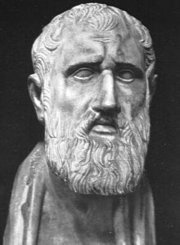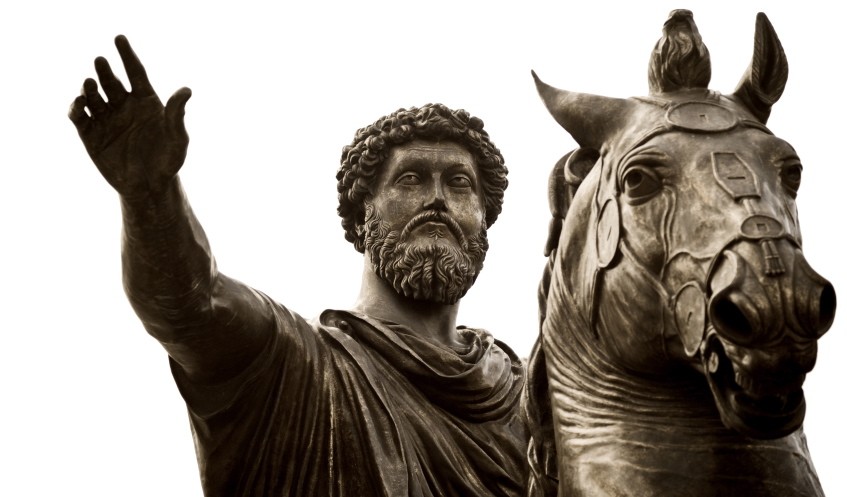
Zeno of Citium
Zeno of Citium was born around 332 BCE, some 10 years after the death of Aristotle. A quiet man who had no desire for dramatic lectures or elaborate festivities, he would become known as the father of Stoicism and lay the foundations for later stoics, including the Roman emperor Marcus Aurelius.
It has been told that while visiting Athens as a young man, Zeno of Citium became acquainted with the cynic
Crates of Thebes, a man who is believed to have been a disciple of
Diogenes of Sinope. It was said that Zeno was taken with the philosophy of the cynics and would later use several of their tenets when developing his own philosophy of Stoicism.
While Zeno admired the cynics, he was too modest to ever fully indulge in their lifestyle of anti-establishment behavior.
Diogenes of Sinope may have thought it okay to urinate and defecate in public, sticking it to the man thousands of years before the hippie revolution. However Zeno was easily embarrassed, and reportedly once ran away in shame after his teacher purposefully poured soup on him.

Cynics like Diogenes of Sinope were influential to Zeno and early stoic thinking.
While Zeno may never have been the cynic that Diogenes was, he certainly shared his no nonsense approach to life. Zeno held little interest in abstract metaphysical thought. And while he studied numerous topics as a philosopher, he would be most well remembered for his work on ethics.
Ethics very simply is the study of what makes something good or bad. We all pretend to understand the concepts of “good” and “bad”, but ethical philosophers look to explain why something was good or why something was bad. Essentially, ethical philosophers set out to try and explain what is the best way to live our lives. Stoicism, therefore, is not fun food for thought. It is a way of life.
Stoicism teaches that the universe is predetermined, sculpted by a supreme lawgiver. We, as humans, can do nothing to change this fact. The only thing we are capable of doing is controlling our own goals and our own thoughts. And this is where the key of stoicism can be found, controlling our own thoughts.
Stoics believe that it is unwise to pursue a life filled with superficial pleasures and lavish desires. We poison ourselves by continuously desiring more and more pleasurable things. And we attempt to find these things at the expense of our own peace. The stoics teach that it is in our power to change this way of thinking. By removing these desires for superficial treasures we can become one with the world around us, a world that is crafted by reason and flows serenely through all of time.
Imagine that you are stuck in a traffic jam. You are late for work, yet the cars ahead just won’t move. You could get angry and start thrashing your fists about. However the stoics would teach you to readjust your thinking. There is nothing you can do about a traffic jam, it is beyond your power. All you can control is how you react to this problem. You can choose to be at peace with your situation. Your inner turmoil is of your own design. The modern British Philosopher,
Bertrand Russell, quotes Epictetus, a later stoic philosopher in his book The History of Western Philosophy when he says:
“sick and yet happy, in peril and yet happy, dying and yet happy, in exile and happy, in disgrace and happy,”- Epictetus, quoted by Bertrand Russell in The History of Western Philosophy
The stoics taught that we were capable of free will, however this free will did not allow us the capacity to change our world. We simply must make the best of our situation and find our contentment within this life, no matter the circumstances. Fulfilling our desires is not what can bring us contentment in life. It is learning to rid ourselves of these desires that can truly bring us to peace.

Marcus Aurelius was a well known stoic.
Stoicism would find favor with much of Hellenistic Greece as well as with later thinkers of the Roman empire. One very notable follower of stoicism is the Roman emperor Marcus Aurelius, who would write extensively about the philosophy in his essay The Meditations. It is rather remarkable that Marcus Aurelius would find contentment by following the modest lessons of stoicism. After all, he was a man who could have had any of his earthly desires fulfilled, and yet he resigned himself to a life of virtue and ethical stability.

Stoicism and Buddhism are often compared for their similar teachings.
Stoicism is often compared to the eastern philosophy of Buddhism. Certainly the notion of doing away with our superficial desires and learning to live in harmony with nature are central tenets of stoicism and Buddhism. It is not unreasonable to make this comparison that stoicism and Buddhism have developed similar ideas. It would give currency to the idea that ethics is a universal concept, that all people look to achieve contentment in life.
Zeno of Citium was known as a quiet man who preferred living modestly. It is unsurprising that he would develop a philosophy that so mirrored his personality. To Zeno, life was not about seizing the most riches and dying in a tomb made of gold. All that matters is that we accept this world as it is and change our own perception to find peace.













One comment
“sick and yet happy, in peril and yet happy, dying and yet happy, in exile and happy, in disgrace and happy,”- Epectitus.
“Jodido, pero contento.” — Woody
Trackbacks
Our apologies, you must be logged in to post a comment.